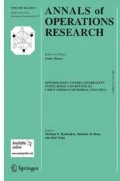Abstract
We study a “hard” optimization problem for metaheuristic search, where a natural neighborhood (that consists of moves for flipping the values of zero-one variables) confronts two local optima, separated by a maximum possible number of moves in the feasible space. Once a descent method reaches the first local optimum, all sequences of feasible moves to reach the second, which is the global optimum, must ultimately pass through solutions that are progressively worse until reaching the worst solution of all, which is adjacent to the global optimum.
We show how certain alternative neighborhoods can locate the global more readily, but disclose that each of these approaches encounters serious difficulties by slightly changing the problem formulation. We also identify other possible approaches that seem at first to be promising but turn out to have deficiencies.
Finally, we observe that a strategic oscillation approach for transitioning between feasible and infeasible space overcomes these difficulties, reinforcing recent published observations about the utility of solution trajectories that alternate between feasibility and infeasibility. We also sketch features of such an approach that have implications for future research.
Similar content being viewed by others
References
Beasley, J. (1993). Lagrangian relaxation. In Modern heuristic techniques for combinatorial problems (pp. 243–303). New York: Wiley.
Eckstein, J., & Nediak, M. (2007). Pivot, cut and dive: a heuristic for mixed 0-1 integer programming. Journal of Heuristics, 13(5), 471–503.
Freville, A., & Plateau, G. (1986). Heuristics and reduction methods for multiple constraint 0-1 linear programming problems. European Journal of Operational Research, 24, 206–215.
Galinier, P., & Hao, J.-K. (2004). A general approach for constraint solving by local search. Journal of Mathematical Modelling and Algorithms, 3(1), 73–88.
Glover, F. (1977). Heuristics for integer programming using surrogate constraints. Decision Sciences, 8(1), 156–166.
Glover, F. (1995). Tabu thresholding: improved search by nonmonotonic trajectories. ORSA Journal on Computing, 7(3), 426–442.
Glover, F. (2000). Multi-start and strategic oscillation methods—principles to exploit adaptive memory. In M. Laguna & J.L. Gonzales Velarde (Eds.), Computing tools for modeling, optimization and simulation: interfaces in computer science and operations research (pp. 1–24). Norwell: Kluwer Academic.
Glover, F. (2003). Tutorial on surrogate constraint approaches for optimization in graphs. Journal of Heuristics, 9(3), 175–227.
Glover, F. (2006). Parametric tabu search for mixed integer programs. Computers and Operations Research, 33(9), 2449–2494.
Glover, F. (2007). Infeasible/feasible search trajectories and directional rounding in integer programming. Journal of Heuristics, 13(6), 505–542.
Glover, F. (2008). Inequalities and target objectives for metaheuristic search—part I: mixed binary optimization. In P. Siarry & Z. Michalewicz (Eds.), Advances in metaheuristics for hard optimization (pp. 439–474). New York: Springer.
Glover, F., & Laguna, M. (1997). Tabu search. Norwell: Kluwer Academic.
Glover, F., Kochenberger, G., Alidaee, B., & Amini, M. M. (1999). Tabu with search critical event memory: an enhanced application for binary quadratic programs. In S. Voss, S. Martello, I. Osman & C. Roucairol (Eds.), MetaHeuristics: advances and trends in local search paradigms for optimization (pp. 93–110). Boston: Kluwer Academic.
Hvattum, L. M., Lokketangen, A., & Glover, F. (2005). New heuristics and adaptive memory procedures for Boolean optimization problems. In J.K. Karlof (Ed.), Integer programming theory and practice (pp. 1–18).
Kelly, J., Golden, B., & Assad, A. (1993). Large scale controlled rounding using tabu search with strategic oscillation. Annals of Operations Research, 41, 69–84.
Lü, Z., & Hao, J.-K. (2008). Adaptive tabu search for course timetabling. European Journal of Operational Research. doi:10.1016/j.ejor.2008.12.007.
Nonobe, K., & Ibaraki, T. (1998). A tabu search approach for the constraint satisfaction problem as a general problem solver. European Journal of Operational Research, 106, 599–623.
Nonobe, K., & Ibaraki, T. (2001). An improved tabu search method for the weighted constraint satisfaction problem. INFOR, 39, 131–151.
Osman, I. H. (1993). Metastrategy simulated annealing and tabu search algorithms for the vehicle routing problem. Annals of Operations Research, 41, 421–451.
Reeves, C. R. (2006). Fitness landscapes. In Search Methodologies. Berlin: Springer, Chap. 19.
Rego, C. (2005). RAMP: a new metaheuristic framework for combinatorial optimization. In C. Rego & B. Alidaee (Eds.), Metaheuristic optimization via memory and evolution: tabu search and scatter search (pp. 441–460). Norwell: Kluwer Academic.
Rego, C., & Alidaee, B. (2005). Metaheuristic optimization via memory and evolution: tabu search and scatter search. Norwell: Kluwer Academic.
Vasquez, M., & Hao, J.-K. (2001a). A heuristic approach for antenna positioning in cellular networks. Journal of Heuristics, 7(5), 443–472.
Vasquez, M., & Hao, J.-K. (2001b). A ‘logic-constrained’ knapsack formulation and a Tabu algorithm for the daily photograph scheduling of an earth observation satellite. Computational Optimization and Applications, 20(2), 137–157.
Author information
Authors and Affiliations
Corresponding author
Rights and permissions
About this article
Cite this article
Glover, F., Hao, JK. The case for strategic oscillation. Ann Oper Res 183, 163–173 (2011). https://doi.org/10.1007/s10479-009-0597-1
Published:
Issue Date:
DOI: https://doi.org/10.1007/s10479-009-0597-1




